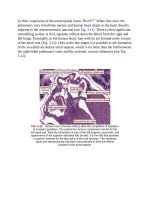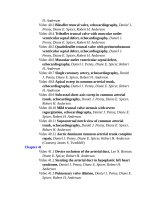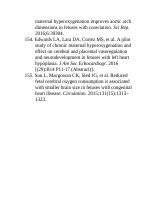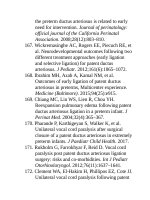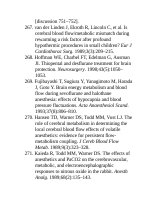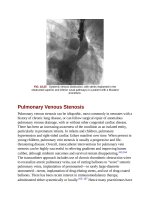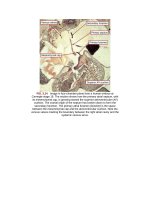Andersons pediatric cardiology 1436
Bạn đang xem bản rút gọn của tài liệu. Xem và tải ngay bản đầy đủ của tài liệu tại đây (131.59 KB, 3 trang )
Carditis
Antiinflammatorydrugshavebeenextensivelyemployedinthetreatmentof
carditis,showingaprompteffectintermsofcardiacsymptoms(Table54.4).
Salicylateshavebeenusedforthosewithnoormildformsofcarditiswhenthere
isnonecessityforpowerfulsuppressionofinflammation.Corticosteroidshave
beenrecommendedforpatientswithatleastmoderatelyseverecarditis,
especiallyforthosewithcongestiveheartfailure.Prednisoneisusuallypreferred
asitproduceslessretentionofsodiumandlossofpotassium.Theinitialdoseof
prednisoneisgivenfor2to3weeksdependingontheseverityofthecarditis.
Afterthisperiod,agradualtaperingisrequired.Thedoseshouldbeslowly
withdrawn,decreasingbyone-fiftheachweek,whichmeansatotaldurationof
thetreatmentofabout8to12weeks,coincidingwiththedurationoftheacute
episode.Reboundsaresometimesassociatedwithrapidwithdrawalof
corticosteroids.Someauthorshaverecommendedanoverlappingtherapywith
theaimtopreventrebounds,withtheintroductionofsalicylatesasthedoseof
corticosteroidsisreduced.Theadvantageoftheuseofhighdosesof
methylprednisoloneasanalternativetreatmentremainscontroversial.Ithasmost
frequentlybeenadministeredasalife-savingtherapyforthosewithsevere
carditis.Theuseofintravenousgammaglobulinhasbeenreportedinpatients
withcarditis,butmoreinvestigationsarerequiredtoevaluatethistherapy.190,192
Table54.4
TreatmentofMajorManifestationsofCarditis
ClinicalManifestation
Severecarditis
Moderatecarditis
Mildcarditis
Polyarthritis
Chorea
TreatmentSchedulea
Prednisoneb2mg/kg/dayoncedaily
Prednisone1–2mg/kg/dayoncedaily
or
Aspirinc75–100mg/daydividedinto4doses
Aspirin75–100mg/daydividedinto4doses
Aspirin75–100mg/daydividedinto4doses
or
Naproxen10–20mg/kg/day
Carbamazepine4–10mg/kg/day
or
Valproicacid20–30mg/kg/day
or
Haloperidold2–6mg/day
aSeetextforcomplementaryinformation.
bMaximumdoseis80mg/day.
cSerumlevelshouldnotexceed30mg/dL.
d
Maximumdoseis6mg/day.
Supportivemeasuresincludethetreatmentofcongestiveheartfailureand
arrhythmias.
Congestiveheartfailureinrheumaticcarditisisoftencontrolledwithbedrest
andcorticosteroids.However,adetailedcardiacassessmentincluding
echocardiographyisrecommendedforallpatientsinheartfailuresecondaryto
rheumaticcarditis.Diureticsandfluidrestrictionshouldbeadministered.
Angiotensin-convertingenzymeinhibitorscanbeusedinpatientswith
significantvalvarregurgitationand/orleftventriculardysfunction.Thelackof
clinicalimprovementduetomechanicalfactorscanbeobservedinpatientswith
severevalvarlesions,mainlyinthosewithrecurrences,andsometimesthe
treatmentissurgical.Cardiacsurgeryisbestdeferredintheacutestageasthe
valverepairisdifficultandlessdurable.However,urgentsurgerymaybe
requiredduetoveryseveremitraland/oraorticregurgitationwithheartfailureor
inthosewithaflailleafletduetochordaetendineaerupture.Repairofthevalve
istobepreferredovervalvereplacementinyoungpatients.193
Arthritis
Salicylatesarethefirst-linetreatmentforpatientswithestablishedarthritisbut
withoutcarditis.Theseagentsusuallyhaveadramaticeffectonthearticular
inflammatoryprocess,withapromptimprovement,commonlywithin24to48
hours.Inthiscontext,prematuretreatmentcaninterfereinthecharacterizationof
themigratorypatternofthearthritis,thusmakingthediagnosisdifficult.
Paracetamolmaybeuseduntilconfirmationofdiagnosis.Thedifferential
diagnosiswithotherdiseasesmustbeconsideredwhenthearticularsymptoms
arenotresponsivetosalicylates.Aneffectiveandsaferdoseofaspirinfor
childrenusuallyproducesalevelofsalicylateinthebloodofnotmorethan20
mg,whichiswellbelowthetoxicrange(seeTable54.4).Thefulldoseisgiven
forthefirst2weeksandsubsequentlyisgraduallyreducedtoupto60mg/kg
overthenext2to3weeks.Asmalleroralargerdosecanbeused,dependingon
theclinicalresponsetotreatment,andmaybemaximizedforthosefailingto
respondtolowerdoses.Ahigherdose,suchas100mg/kg,isrequiredbyfew
patients.Ifmoremassivedosesofsalicylatesaregiven,toxicitycanoccur.Rapid
breathingisoneoftheearlysignsoftoxicity.Nausea,vomiting,tinnitus,
lassitude,andoccasionallydelirium,convulsion,andcomacanoccur.Naproxen
isanalternativetherapyforpatientswhoareallergictoorintolerantof
aspirin.1,194,195Ithassimilaranalgesicpotencyassalicylatebutdoesnothave
theriskofReyesyndrome,ararecomplicationofsalicylate.Othernonsteroidal
antiinflammatorydrugshavenotbeensystematicallyusedtoestablishtheirrole.
SydenhamChorea
Isolatedchoreaistreatedsymptomatically.Thepatientsshouldbekeptinaquiet
environmenttoprotectthemfromexternalstimulationandstress.Mildchorea
maynotrequireanyspecifictreatment.Precautionsmustbetakentoprevent
accidentsand,accordingtotheircondition,appropriatesedationcanbehelpful.
Asmostdrugsusedforchoreaarenotwithoutsideeffects,treatmentshouldbe
consideredifsymptomsaffectthenormalactivitiessignificantlyorpatienthas
riskofinjury.Valproicacidandcarbamazepinearepreferredoverhaloperidolas
haloperidolhassignificantsideeffects.196–199Carbamazepineshouldbeused
initiallyandvalproicacidgivenforrefractorycases(seeTable54.4).
Antiinflammatoryagentsareusuallynotindicatedbecausechoreaoften
occursaftertheresolutionofthesystemicinflammatoryprocess.Theuseof
corticosteroidsandimmunoglobulininpatientswithisolatedSydenhamchorea
iscontroversial.200–205Ashortcourseofcorticosteroidsmaybeconsideredfor
severerefractorycases.TheneedfortheeradicationofStreptococcus,followed
byregularsecondaryprophylaxis,isasimportantinchoreaasinanyother
rheumaticmanifestation.Duetothemorerecentobservationsregardingthe
neuropsychiatricdisordersandpersistentdisabilitiesinsomepatients,amore
aggressivetreatmenthasbeenrecommended,alongwiththeneedforcloser
vigilanceintheperiodoffollow-up.139–141,206,207
Rebounds
Clinicalorlaboratoryevidenceofreboundsisinfrequent.Theycanbeseenafter
cessationoftheantiinflammatorytreatment,andusuallyoccurwithin2to3
weeks.Somepatientsshowonlylaboratoryabnormalities.Thosewithclinical
reboundsusuallyshowarthralgia,fever,andoccasionallyarthritis,butsevere
cardiacmanifestationsmayalsooccur.Reboundsoccurmoreoftenafter
corticosteroidtherapythansalicylates.Additionofsalicylatestosteroidsatthe
